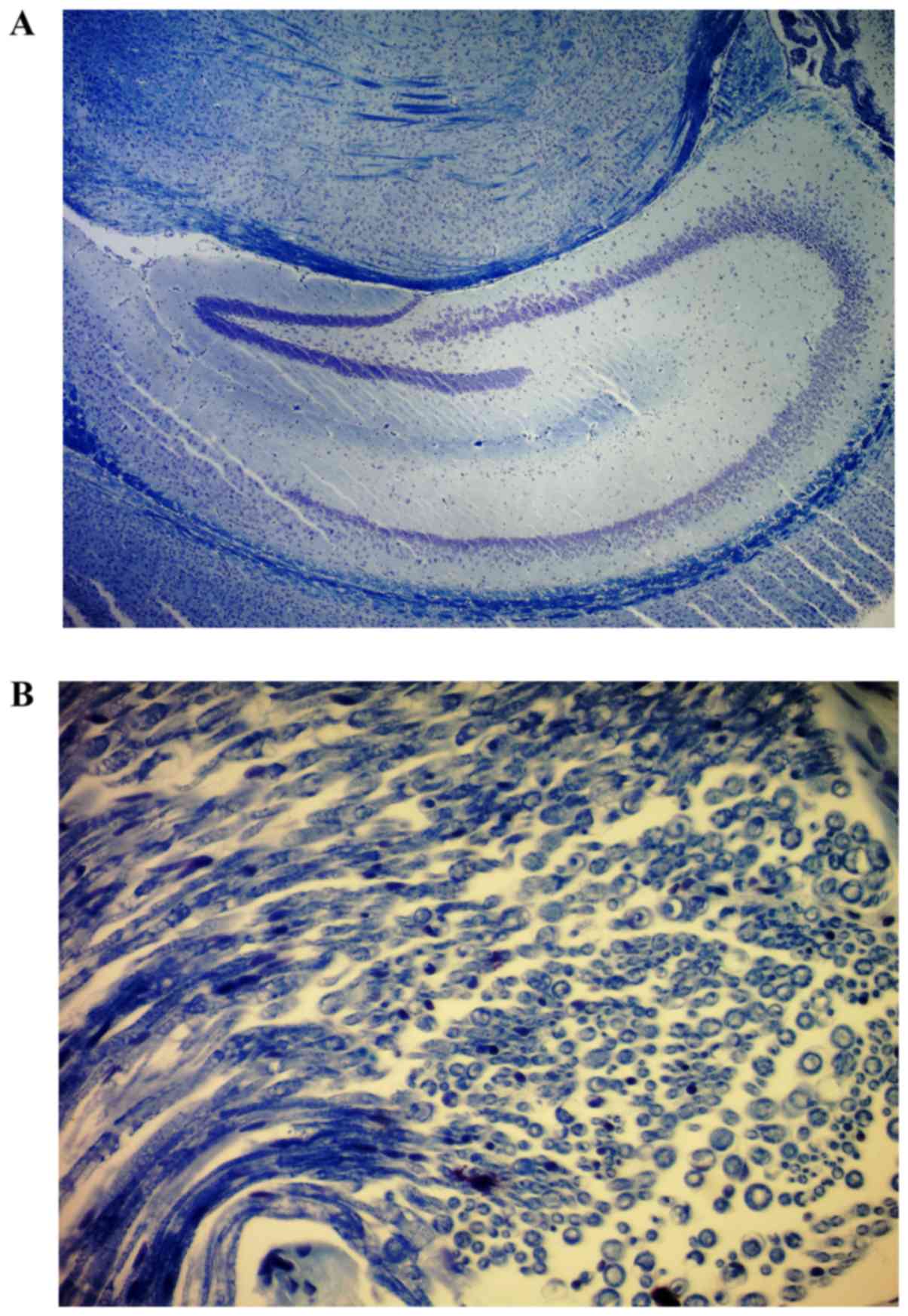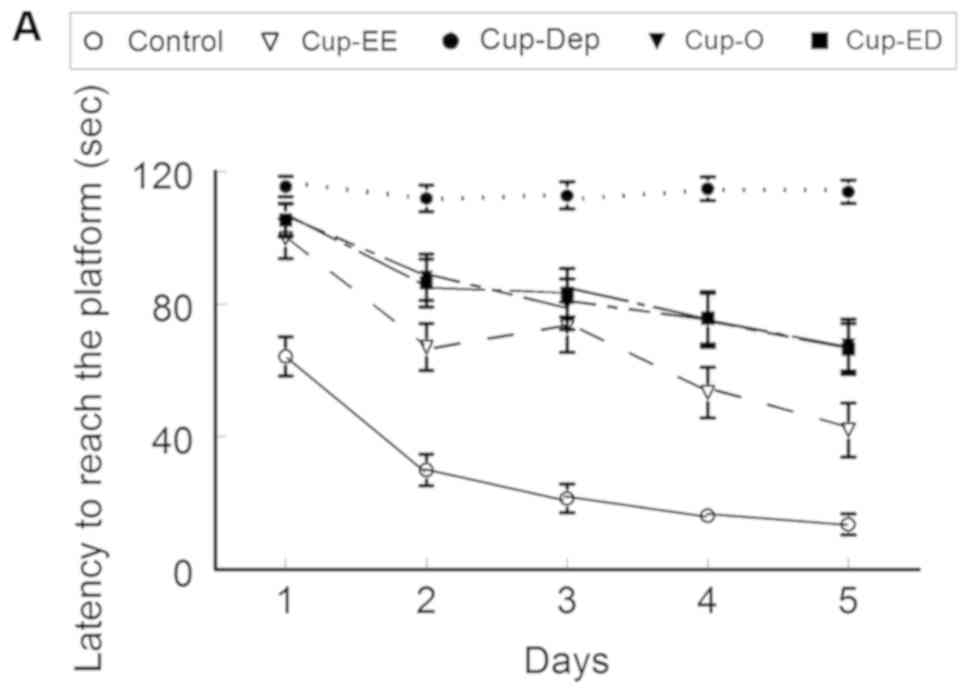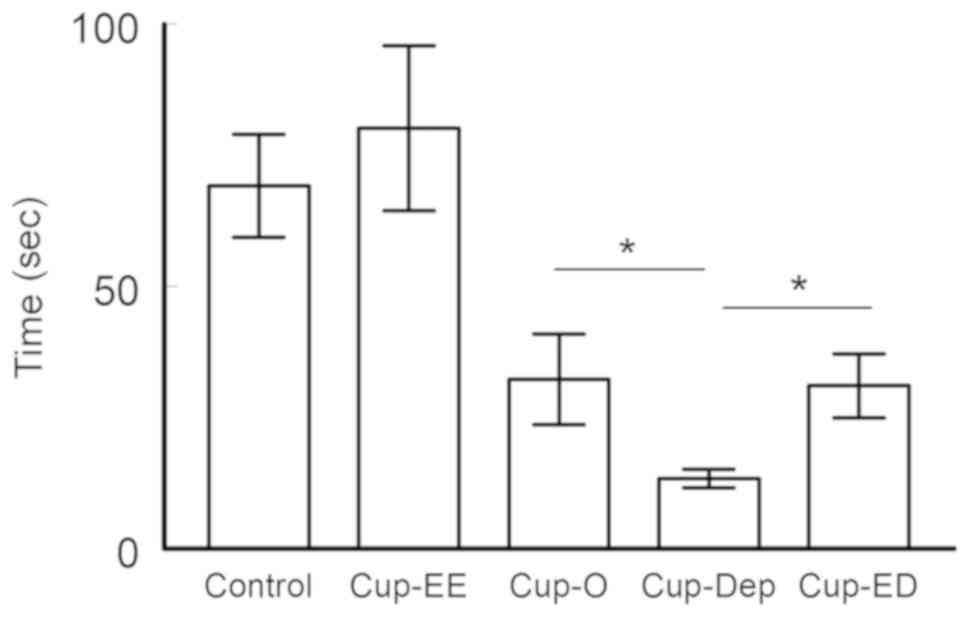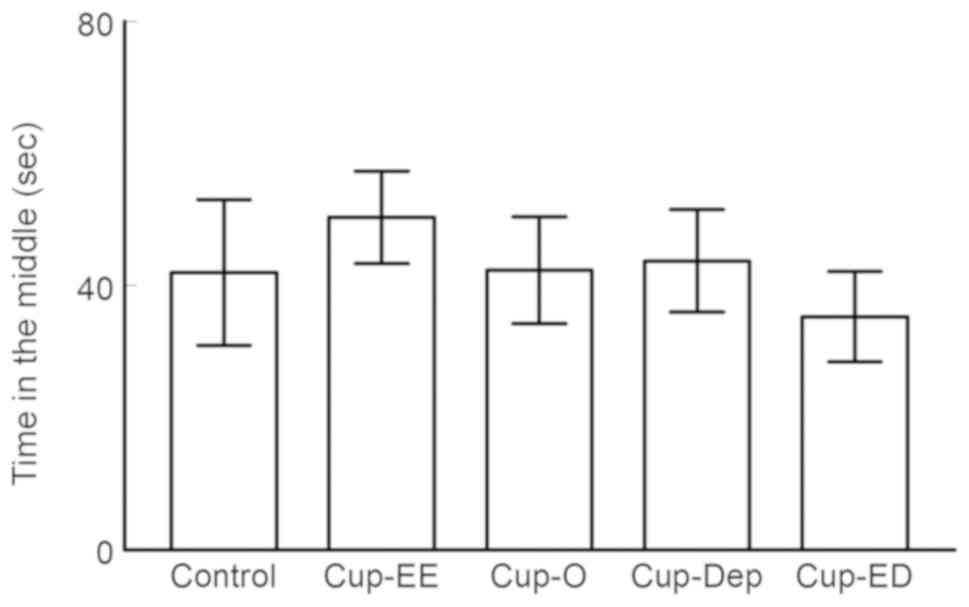|
1
|
Beer S, Khan F and Kesselring J:
Rehabilitation interventions in multiple sclerosis: An overview. J
Neurol. 259:1994–2008. 2012. View Article : Google Scholar : PubMed/NCBI
|
|
2
|
Langdon DW, Amato MP, Boringa J, Brochet
B, Foley F, Fredrikson S, Hämäläinen P, Hartung HP, Krupp L, Penner
IK, et al: Recommendations for a Brief International Cognitive
Assessment for Multiple Sclerosis (BICAMS). Mult Scler. 18:891–898.
2012. View Article : Google Scholar : PubMed/NCBI
|
|
3
|
Amato MP, Zipoli V and Portaccio E:
Multiple sclerosis-related cognitive changes: A review of
cross-sectional and longitudinal studies. J Neurol Sci. 245:41–46.
2006. View Article : Google Scholar : PubMed/NCBI
|
|
4
|
Cioncoloni D, Innocenti I, Bartalini S,
Santamecchi E, Rossi S, Rossi A and Ulivelli M: Individual factors
enhance poor health-related quality of life outcome in multiple
sclerosis patients. Significance of predictive determinants. J
Neurol Sci. 345:213–219. 2014. View Article : Google Scholar : PubMed/NCBI
|
|
5
|
Salter A, Thomas N, Tyry T, Cutter G and
Marrie RA: Employment and absenteeism in working-age persons with
multiple sclerosis. J Med Econ. 20:493–502. 2017. View Article : Google Scholar : PubMed/NCBI
|
|
6
|
Raimo S, Trojano L, Pappacena S, Alaia R,
Spitaleri D, Grossi D and Santangelo G: Neuropsychological
correlates of theory of mind deficits in patients with multiple
sclerosis. Neuropsychology. 31:811–821. 2017. View Article : Google Scholar : PubMed/NCBI
|
|
7
|
Gay MC, Bungener C, Thomas S, Vrignaud P,
Thomas PW, Baker R, Montel S, Heinzlef O, Papeix C, Assouad R and
Montreuil M: Anxiety, emotional processing and depression in people
with multiple sclerosis. BMC Neurol. 17:432017. View Article : Google Scholar : PubMed/NCBI
|
|
8
|
Rahn K, Slusher B and Kaplin A: Cognitive
impairment in multiple sclerosis: A forgotten disability
remembered. Cerebrum. 2012:142012.PubMed/NCBI
|
|
9
|
Siegert RJ and Abernethy DA: Depression in
multiple sclerosis: A review. J Neurol Neurosurg Psychiatry.
76:469–475. 2005. View Article : Google Scholar : PubMed/NCBI
|
|
10
|
Kazlauckas V, Pagnussat N, Mioranzza S,
Kalinine E, Nunes F, Pettenuzzo L, Souza DO, Portela LV,
Porciúncula LO and Lara DR: Enriched environment effects on
behavior, memory and BDNF in low and high exploratory mice. Physiol
Behav. 102:475–480. 2011. View Article : Google Scholar : PubMed/NCBI
|
|
11
|
Zhao YY, Shi XY, Qiu X, Lu W, Yang S, Li
C, Chen L, Zhang L, Cheng GH and Tang Y: Enriched environment
increases the myelinated nerve fibers of aged rat corpus callosum.
Anat Rec (Hoboken). 295:999–1005. 2012. View Article : Google Scholar : PubMed/NCBI
|
|
12
|
Cao W, Duan J, Wang X, Zhong X, Hu Z,
Huang F, Wang H, Zhang J, Li F, Zhang J, et al: Early enriched
environment induces an increased conversion of proBDNF to BDNF in
the adult rat's hippocampus. Behav Brain Res. 265:76–83. 2014.
View Article : Google Scholar : PubMed/NCBI
|
|
13
|
Wood NI, Carta V, Milde S, Skillings EA,
McAllister CJ, Ang YL, Duguid A, Wijesuriya N, Afzal SM, Fernandes
JX, et al: Responses to environmental enrichment differ with sex
and genotype in a transgenic mouse model of huntington's disease.
PLoS One. 5:e90772010. View Article : Google Scholar : PubMed/NCBI
|
|
14
|
Magalon K, Cantarella C, Monti G, Cayre M
and Durbec P: Enriched environment promotes adult neural progenitor
cell mobilization in mouse demyelination models. Eur J Neurosci.
25:761–771. 2007. View Article : Google Scholar : PubMed/NCBI
|
|
15
|
Kipp M, Clarner T, Dang J, Copray S and
Beyer C: The cuprizone animal model: New insights into an old
story. Acta Neuropathol. 118:723–736. 2009. View Article : Google Scholar : PubMed/NCBI
|
|
16
|
Torkildsen O, Brunborg LA, Myhr KM and Bø
L: The cuprizone model for demyelination. Acta Neurol Scand Suppl.
188:72–76. 2008. View Article : Google Scholar : PubMed/NCBI
|
|
17
|
Kipp M, Nyamoya S, Hochstrasser T and Amor
S: Multiple sclerosis animal models: A clinical and
histopathological perspective. Brain Pathol. 27:123–137. 2017.
View Article : Google Scholar : PubMed/NCBI
|
|
18
|
Komoly S: Experimental demyelination
caused by primary oligodendrocyte dystrophy. Regional distribution
of the lesions in the nervous system of mice [corrected]. Ideggyogy
Sz. 58:40–43. 2005.PubMed/NCBI
|
|
19
|
Stidworthy MF, Genoud S, Suter U, Mantei N
and Franklin RJ: Quantifying the early stages of remyelination
following cuprizone-induced demyelination. Brain Pathol.
13:329–339. 2003. View Article : Google Scholar : PubMed/NCBI
|
|
20
|
Matsushima GK and Morell P: The
neurotoxicant, cuprizone, as a model to study demyelination and
remyelination in the central nervous system. Brain Pathol.
11:107–116. 2001. View Article : Google Scholar : PubMed/NCBI
|
|
21
|
Morell P, Barrett CV, Mason JL, Toews AD,
Hostettler JD, Knapp GW and Matsushima GK: Gene expression in brain
during cuprizone-induced demyelination and remyelination. Mol Cell
Neurosci. 12:220–227. 1998. View Article : Google Scholar : PubMed/NCBI
|
|
22
|
Skripuletz T, Gudi V, Hackstette D and
Stangel M: De-and remyelination in the CNS white and grey matter
induced by cuprizone: The old, the new, and the unexpected. Histol
Histopathol. 26:1585–1597. 2011.PubMed/NCBI
|
|
23
|
Dumitrascu OM, Mott KR and Ghiasi H: A
comparative study of experimental mouse models of central nervous
system demyelination. Gene Ther. 21:599–608. 2014. View Article : Google Scholar : PubMed/NCBI
|
|
24
|
Ingram G, Loveless S, Howell OW, Hakobyan
S, Dancey B, Harris CL, Robertson NP, Neal JW and Morgan BP:
Complement activation in multiple sclerosis plaques: An
immunohistochemical analysis. Acta Neuropathol Commun. 2:532014.
View Article : Google Scholar : PubMed/NCBI
|
|
25
|
Artola A, von Frijtag JC, Fermont PC,
Gispen WH, Schrama LH, Kamal A and Spruijt BM: Long-lasting
modulation of the induction of LTD and LTP in rat hippocampal CA1
by behavioural stress and environmental enrichment. Eur J Neurosci.
23:261–272. 2006. View Article : Google Scholar : PubMed/NCBI
|
|
26
|
Yankelevitch-Yahav R, Franko M, Huly A and
Doron R: The forced swim test as a model of depressive-like
behavior. J Vis Exp. 2–Mar;2015.doi: 10.3791/52587. View Article : Google Scholar
|
|
27
|
Castagné V, Moser P and Porsolt RD:
Behavioral assessment of antidepressant activity in rodents.
Methods of behavior analysis in neuroscience. 2nd. Boca Raton (FL):
CRCPress/Taylor & Francis; 2009
|
|
28
|
Porsolt RD, Le Pichon M and Jalfre M:
Depression: A new animal model sensitive to antidepressant
treatments. Nature. 266:730–732. 1977. View
Article : Google Scholar : PubMed/NCBI
|
|
29
|
Porsolt RD, Bertin A and Jalfre M:
‘Behavioural despair’ in rats and mice: Strain differences and the
effects of imipramine. Eur J Pharmacol. 51:291–294. 1978.
View Article : Google Scholar : PubMed/NCBI
|
|
30
|
Stone EA, Lin Y and Quartermain D:
Evaluation of the repeated open-space swim model of depression in
the mouse. Pharmacol Biochem Behav. 91:190–195. 2008. View Article : Google Scholar : PubMed/NCBI
|
|
31
|
D'Hooge R and De Deyn PP: Applications of
the Morris water maze in the study of learning and memory. Brain
Res Brain Res Rev. 36:60–90. 2001. View Article : Google Scholar : PubMed/NCBI
|
|
32
|
Bohlen M, Cameron A, Metten P, Crabbe JC
and Wahlsten D: Calibration of rotational acceleration for the
rotarod test of rodent motor coordination. J Neurosci Methods.
178:10–14. 2009. View Article : Google Scholar : PubMed/NCBI
|
|
33
|
Sachs HH, Bercury KK, Popescu DC,
Narayanan SP and Macklin WB: A new model of cuprizone-mediated
demyelination/remyelination. ASN Neuro. 6(pii):
17590914145519552014.PubMed/NCBI
|
|
34
|
Boeschoten RE, Braamse AMJ, Beekman ATF,
Cuijpers P, van Oppen P, Dekker J and Uitdehaag BMJ: Prevalence of
depression and anxiety in Multiple Sclerosis: A systematic review
and meta-analysis. J Neurol Sci. 372:331–341. 2017. View Article : Google Scholar : PubMed/NCBI
|
|
35
|
Bilgi E, Özdemir HH, Bingol A and Bulut S:
Evaluation of the effects of group psychotherapy on cognitive
function in patients with multiple sclerosis with cognitive
dysfunction and depression. Arq Neuropsiquiatr. 73:90–95. 2015.
View Article : Google Scholar : PubMed/NCBI
|
|
36
|
Alwis DS and Rajan R: Environmental
enrichment and the sensory brain: The role of enrichment in
remediating brain injury. Front Syst Neurosci. 8:1562014.
View Article : Google Scholar : PubMed/NCBI
|
|
37
|
Serra-de-Oliveira N, Boilesen SN, Prado de
França Carvalho C, LsSueur-Maluf L, Zollner Rde L, Spadari RC,
Medalha CC and Monteiro de Castro G: Behavioural changes observed
in demyelination model shares similarities with white matter
abnormalities in humans. Behav Brain Res. 287:265–275. 2015.
View Article : Google Scholar : PubMed/NCBI
|
|
38
|
Acharjee S, Nayani N, Tsutsui M, Hill MN,
Ousman SS and Pitman QJ: Altered cognitive-emotional behavior in
early experimental autoimmune encephalitis-Cytokine and hormonal
correlates. Brain Behav Immun. 33:164–172. 2013. View Article : Google Scholar : PubMed/NCBI
|
|
39
|
Rodrigues DH, Vilela Mde C,
Lacerda-Queiroz N, Miranda AS, Sousa LF, Reis HJ and Teixeira AL:
Behavioral investigation of mice with experimental autoimmune
encephalomyelitis. Arq Neuropsiquiatr. 69:938–942. 2011. View Article : Google Scholar : PubMed/NCBI
|
|
40
|
Spires TL and Hannan AJ: Nature, nurture
and neurology: Gene-environment interactions in neurodegenerative
disease. FEBS Anniversary Prize Lecture delivered on 27 June 2004
at the 29th FEBS Congress in Warsaw. FEBS J. 272:2347–2361. 2005.
View Article : Google Scholar : PubMed/NCBI
|
|
41
|
Von Frijtag JC, Kamal A, Reijmers LG,
Schrama LH, van den Bos R and Spruijt BM: Chronic imipramine
treatment partially reverses the long-term changes of hippocampal
synaptic plasticity in socially stressed rats. Neurosci Lett.
309:153–156. 2001. View Article : Google Scholar : PubMed/NCBI
|
|
42
|
Bliss TV and Cooke SF: Long-term
potentiation and long-term depression: A clinical perspective.
Clinics (Sao Paulo). 66 (Suppl 1):S3–S17. 2011. View Article : Google Scholar
|


















